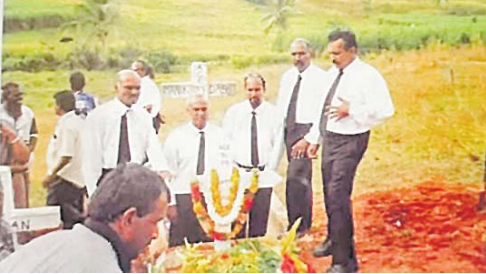Last week, we watched as Fr Frank Hoare grappled with the challenges of Sunday Mass attendance in Naleba, reflecting on his own motivations and witnessing a powerful moment of reconciliation at a Hindu funeral. This week, we journey with him deeper into 1976, where he navigates the cultural sensitivities of baptism by immersion, experiments with preaching psychological concepts in Hindi, and quietly observes the enduring weight of marital vows in a Hindu household. In the next chapter of his mission, Fr Hoare’s humility and openness continue to shape his evolving relationship with the Indo-Fijian community.
Somber realities
In his second year at Naleba, Father Hoare had settled into a regular rhythm of ministry. He led mandalis (neighbourhood prayer meetings), catechism classes for schoolchildren, and gatherings with women’s groups.
His work also extended beyond the Catholic community; he was frequently invited to speak at Hindu and Muslim funerals and weddings.
However, he faced persistent challenges with Sunday Mass attendance.
Having grown up with the belief that missing Mass was a mortal sin, Fr Hoare was troubled to find church attendance in Naleba sparse.
It’s September 1, 1976, and any parishioner cited work commitments, especially during sugar cane season or social obligations as reasons for their absence.
In response, Father Hoare began Saturday home visits to remind families of their religious duty.
“I considered myself a zealous young priest, tasked with improving the practice of the faith.
“So I began visiting the Catholic homes on Saturdays to remind them of our duty to attend Sunday Mass.
“Don’t forget now. Ten o’ clock. Don’t be late.
“There will still be time to go to the wedding or entertain visitors afterwards!”
“It felt good to see the numbers at Mass improving.”
However when he left temporarily to study the i-Taukei language, the numbers dropped again. This led to a sobering realisation: many had come not from spiritual conviction, but because of his personal pressure.
He also recognised a deeper struggle within himself.
The drive to “fill the church” was not solely for God’s glory, it was partly fueled by his own desire for achievement and validation, a pattern rooted in childhood memories of academic competition and parental expectations.
Reconciliation in the Indian culture
That same morning, Fr Hoare received a visit from his friend, Prabhu Dass.
They set off to a nearby home in hopes of encouraging an elderly man, estranged from his son-in-law’s family due to a past dispute, to attend a funeral in Lagalaga.
The son-in-law had died suddenly in a car accident.
Mr Dass believed that the funeral could serve as a bridge for reconciliation between the grieving families.
After some hesitation and gentle persuasion, the elderly man agreed to attend.
At the funeral, Fr Hoare initially felt like an outsider among the mourners. But by introducing himself personally to each group of men present, he gradually broke the ice.
The simple act of making himself known softened the gathering.
After the service, Subramani, the grieving father-in-law, approached Fr Hoare and said “My father and son have both died. I have no one now ahead of me or behind me.”
“Will you come back here in a few weeks’ time and explain life and death to me?”
The invitation, from a Hindu man he had never met, left Fr Hoare deeply moved. It was, for him, a sign of profound trust and a call to prepare thoughtfully for deeper interfaith dialogue.
Tirikuttu: A South Indian folk dance
It’s September 13 and cultural tensions surfaced when a dispute arose in the Naleba church committee regarding Tirikuttu, a traditional South Indian folk drama rooted in Hindu scripture and ritual.
It usually tells a story in song from the Mahabharat Hindu scriptures, often focused on Draupadi, wife of the Pandava brothers. The actors wear very colorful costumes.
It is performed in an open space with the audience sitting or standing on three sides while the all-male actors perform in front of the musicians and chorus.
A prayer is said to Ganesh, the elephant god and remover of obstacles, at the beginning of a performance.
The committee president used to participate. In fact, he was one of the teachers or directors of the dance drama.
However, the committee secretary believed his participation was scandalous.
When asked, the president explained that he regarded Tirikuttu as simple cultural entertainment.
Fr Hoare, uncertain of the religious implications and underlying conflicts, chose not to intervene.
The matter resurfaced months later, when the president and another Catholic man arrived at church early one Sunday morning, exhausted from an overnight performance. They asked for permission to say their prayers and return home to sleep, skipping Mass. Fr Hoare declined to grant that permission.
“I hadn’t made the Church law of attending Mass on Sunday.
“You’ll have to decide according to your conscience.”
Despite their disappointment, both men remained and attended the service.
Fr Hoare’s account from Naleba captures a critical moment in his development as a priest.
The rural cane fields of Labasa, in all their quiet complexity, had become for him a crucible of growth, not just for those he served, but for the young priest himself.
In next week’s edition of the Fiji Times we join Fr Hoare and his team on a moonlit mission to screen a Hindi film in a remote settlement, only to find themselves stranded on a railway line with a sugar train fast approaching.

